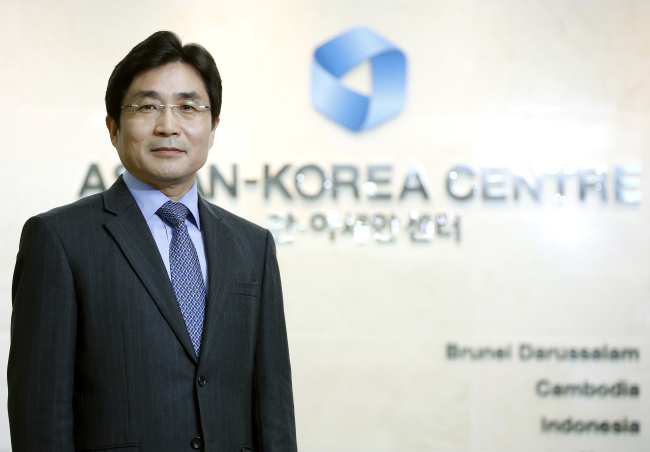‘ASEAN, Korean youths foresee strong partnership’: report
By Joel LeePublished : Nov. 9, 2017 - 16:46
Amid South Korean President Moon Jae-in’s weeklong tour of Southeast Asian countries that started Wednesday, a seminal report prefiguring a bright future relationship between the Association of Southeast Asian Nations and Korea has been released.
“A survey on mutual perceptions of ASEAN and Korean youths,” co-published by the ASEAN-Korea Center and Korea Institute of Southeast Asian Studies, is an inquiry into the minds of young generations who will form the bedrock of the two regions’ sustainable partnerships.
The ASEAN Community formed in 2015 comprises of three pillars of political-security, economic and socio-cultural communities. While the first two are important as institutional frameworks, the last is the most rudimentary and resilient element of ASEAN’s integration and global cooperation, analysts say. They point out that as the region develops economically, grassroots, bottom-up exchanges between people through culture, education and tourism will rise in number and importance.
In this regard, the general positive perceptions identified in the survey betoken increasingly interactive ties between ASEAN and Korea, while leaving room for improvement in certain areas.
“A survey on mutual perceptions of ASEAN and Korean youths,” co-published by the ASEAN-Korea Center and Korea Institute of Southeast Asian Studies, is an inquiry into the minds of young generations who will form the bedrock of the two regions’ sustainable partnerships.
The ASEAN Community formed in 2015 comprises of three pillars of political-security, economic and socio-cultural communities. While the first two are important as institutional frameworks, the last is the most rudimentary and resilient element of ASEAN’s integration and global cooperation, analysts say. They point out that as the region develops economically, grassroots, bottom-up exchanges between people through culture, education and tourism will rise in number and importance.
In this regard, the general positive perceptions identified in the survey betoken increasingly interactive ties between ASEAN and Korea, while leaving room for improvement in certain areas.

The survey was conducted on over 1,000 Korean and 320 ASEAN students here between ages 20 and 35 from March through August. Of the key findings, both sides viewed their futures as positively entwined, with 64 percent of Korean and 82 percent of ASEAN students foreseeing an optimistic partnership.
Koreans were concerned by international marriage, economic cooperation, overseas labor and tourism in order of importance regarding ASEAN, while Southeast Asians viewed economic cooperation, tourism, overseas labor, international studies, foreign investment and popular culture in order of importance concerning Korea.
About 47 percent of ASEAN students said they came to Korea to study because of scholarship benefits and economic reasons. It was followed by 27 percent of them having “curiosity and intimacy” toward Korea; 10 percent following recommendations from families, relatives, friends and teachers; and 7 percent expecting employment benefits after graduation.
A total of 58 percent of them said Korea benefits their countries’ development.
“The report is meaningful in that it is the first-ever attempt at objectively analyzing the perceptions of Korean and ASEAN students in Korea,” said the center’s Secretary-General Kim Young-sun, former Korean ambassador to Indonesia from 2011-2014. “It is highly encouraging in that the youths who will lead the future of both regions have optimistic views of each other. We plan to expand the surveys from students to the general public, as well as from Korea to the whole of ASEAN, so that we can use these data as basis for various future endeavors and co-projects.”
The administration of President Moon signaled the country’s intention to give more substance to its relations with ASEAN by dispatching first-ever special envoy Seoul Mayor Park Won-soon to the region in May. ASEAN and Korea first established a sectoral dialogue partnership in 1989, which was elevated to a full dialogue partnership in 1991 and strategic partnership in 2010. The current administration is committed to ASEAN as part of its diplomatic diversification strategy.
Since the entry into force of the ASEAN-Korea Trade in Goods Agreement in June 2007, bilateral trade in goods has grown by 9.2 percent annually, reaching $125 billion last year, and making Korea ASEAN’s fifth-largest trade partner. ASEAN is Korea’s second-largest trade partner and top investment destination, and the two sides are working to reach $200 billion in bilateral trade by 2020.
An outcome of the 1967 Bangkok Declaration, ASEAN was initially established as a bloc of Southeast Asian nations Indonesia, Malaysia, the Philippines, Singapore and Thailand. It later expanded to incorporate Brunei, Cambodia, Laos, Myanmar and Vietnam. Its economy is the sixth-largest in the world with a combined gross domestic product of $2.6 trillion last year and 670 million people.
By Joel Lee (joel@heraldcorp.com)


















![[Today’s K-pop] Treasure to publish magazine for debut anniversary](http://res.heraldm.com/phpwas/restmb_idxmake.php?idx=642&simg=/content/image/2024/07/26/20240726050551_0.jpg&u=)